Should you trust online travel reviews or not? My opinion on when to trust them.
If you’re planning a trip, travel reviews can be a great source of information and inspiration. You can find online reviews on various platforms, from online websites and podcasts to magazines. They offer insights and tips from the professionals or from other travelers who have visited the same destination or done the same activity.
But are travel reviews always reliable? Should you choose your travel destination based on some reviews?
I show you in this post my opinion on the subject and when I believe you can trust the reviews, and when you shouldn’t.
Travel reviews can provide useful information and feedback
If you’re planning a trip and want to know more about a particular place or service, travel reviews are a fantastic resource. They can tell you all sort of useful information.
You can learn from travel reviews:
- where a place is located
- how easy it is to get to
- how safe it is
- how clean it is
- what the customer service is like
- how much it costs
- whether it’s available when you need it
- what the atmosphere is like
For example, if you’re thinking about booking a hotel, you can look at reviews from people who have already stayed there to see what their experience was. They might even mention any problems or issues they had so you can avoid them.
To learn what kind of places are out here read my other guide.
Travel reviews can give you ideas and inspiration
Travel reviews offer valuable information and fresh ideas for all types of travelers, seasoned or newbies. Reading about others’ experiences can help you discover new and fun places to go and things to do that you may not have thought about before.
For instance, you might come across a review of a small town you might never heard of, but that sounds like the perfect spot for a weekend getaway. Or you might read or heard about a restaurant that serves up the most delicious local cuisine that you simply have to try.
Maybe you heard about some great place from your friend? Perhaps that was your online friend and he posted the review in his blog?
Locals and experienced travelers share insights and tips that first-time tourists may not know. Reading reviews from other travelers can help you find unforgettable experiences you might have missed.
Reviews can help you plan your trip by showing you what other travelers enjoyed the most. You can use this information to create your itinerary.
They help you discover some hidden gems, like L’Espluga De Francoli in Catalonia, Spain.
Or, perhaps a hike that wasn’t on your radar, or a museum that you might have overlooked, like Sintra National Palace in Sintra, Portugal. Everyone knows the other famous Pena Palace, but I always suggest to visit Sintra Palace instead. Another unique museum to visit is National Coach Museum in Lisbon; as you can tell from my review of it, it found it to be a fantastic museum.
Travel reviews can help you confirm your choice of a vacation destination.
Travel reviews can help you compare your options
Travel customers reviews give you a better idea of what your travel experience will be like than promotional materials. Pictures and descriptions on travel brochures or websites may not be completely true.
Reviews from other recent travelers can offer a more accurate and unbiased perspective (but not always!) helping you make a better decision.
Sometimes reviewers even post a video on YouTube, like I did for tram 28 in Lisbon and for exquisite Saint Bartholomew Chapel in Cordoba, Spain. I wouldn’t even know it existed myself, if not for someone ease’s video I saw and decided on visiting myself.
So next time you’re looking for a travel inspiration, be sure to browse through some reviews or travel blogs and YouTube videos, and see where they take you!
However, basing your opinion only on travel reviews can give you an incomplete or unfair view of a place because every person’s experience is different.
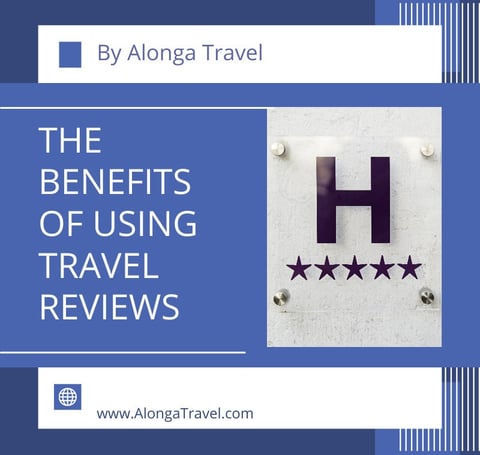
The benefits of using travel reviews
Travel reviews are not always accurate for a number of reasons. Some reviews could be misleading because of peoples personalities or mood. Straight up fake or misleading reviews can be posted by people or companies with hidden agendas.
Let’s look at all the scenarios that result in inaccurate or misleading reviews.
Travel reviews are subjective and biased
All travel reviews are subjective and bias because people’s opinions are subjective. The same as all personal recommendations are subjective. What seems great to one person is not that great to another. Why is that?
Get more inspiration!
Subscribe to my newsletter!
Reviewers may have different preferences and expectations than you
Often, travel reviews can be misleading because every person has their own unique preferences and expectations. One traveler may like a quiet and comfortable hotel, while another may want a more social and livelier environment.
People also have different standards and expectations when it comes to service and amenities. It’s important to take into account the context of the reviewer. For example, someone who is used to luxury accommodations may find a budget hotel disappointing. While someone on a tight budget may appreciate the same hotel for its affordability.
This means that what one reviewer sees as a positive or negative aspect may not be the same as what you are looking for.
Let’s look on online hotel review by different reviews to see how they differ. Let’s check out both positive reviews and bad reviews.
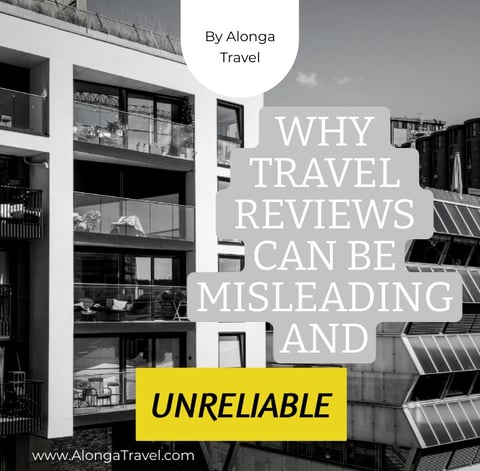
Why travel reviews can be misleading and unreliable
Travel reviews can be misleading or just unreliable. For example, below are a few different reviews of the same hotel.
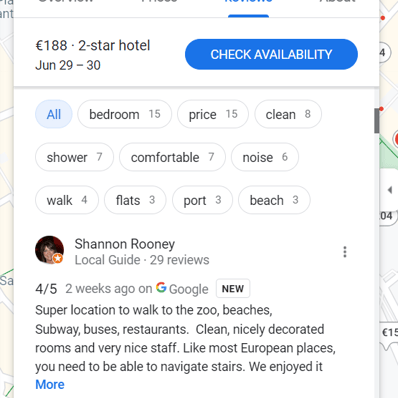
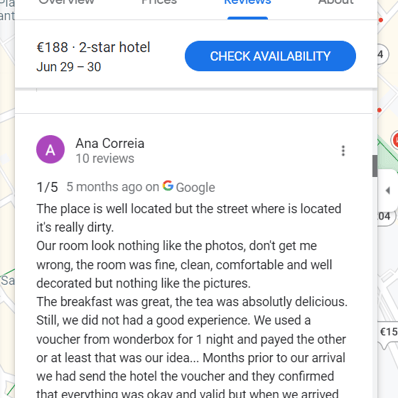
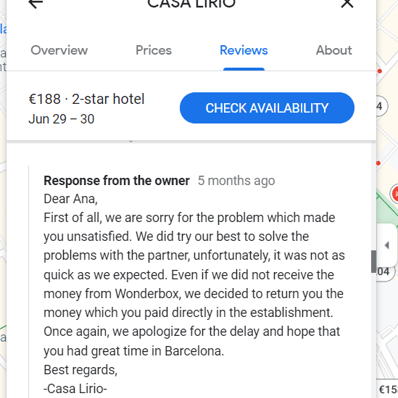
Notice how all of the above reviews are praising the hotel, but one person’s review is a good example of a misleading review. This person left a 1-star negative review that actually praises the hotel, except for one thing. That one thing was later resolved in her favor, with the hotel losing money, even though it was not the hotel’s fault. But the owner chose to do that anyway to please the client.
This is, by the way, a great sign – when the hotel’s management replies to a negative review with an apology and chooses to solve the case in the customer’s favor. This is a winner right here, and you should go to this place if you like other things about this hotel.
At the same time, pay attention to the owners making excuses for their behavior and minimizing the customer’s concerns. This is a big no-no for me, personally.
However, not every person who left a review was honest. Read about this below in my post.
reviewers may be influenced by emotions
Reviewers’ personalities also play a huge role in the review. Some people made a point of not reacting to small (in their opinion) stuff in their life. While others make quite a deal of some small (in other people’s opinion) things.
On the other hand, some people might have had an unpleasant experience that wasn’t the hotel or service provider’s fault. For example, bad weather or personal problems could have affected their stay. But they may still leave a negative review and it’s not fair.
Travel reviews may not always be completely honest or objective
Travel reviews may also not always be completely honest or objective.
It’s possible that some reviewers got discounts or rewards from the hotel or the restaurant, which could influence their review to be more positive. They should mention this in a disclaimer on their post, but there’s no guarantee they will.
The reviews may also be fake or misleading
The reviews may also be fake or manipulated by the place or service itself or by its competitors.
A positive review for a hotel could be written by the hotel owner. Perhaps, it’s a review written by an employee by business owners demand, or someone who got a free stay or reward for their review.
Likewise, a fake review for a hotel might be from a competitor.
Because of all this, you should not take every review at face value, but look for signs of bias or manipulation in the reviews. If a reviews seem suspicious, check out all the other reviews.
Fraudulent reviews
Some hotel review could even be straight fraudulent, when a provider will try to extract your money for no service provided.
Watch out for accommodations with few reviews. They maybe just a new provider, or they could be something entirely else.
Here is an example of a fraudulent review that will be created soon. Someone was looking for “good reviews for hotel examples, and since Google has it, it mean a lot of people were looking for that.
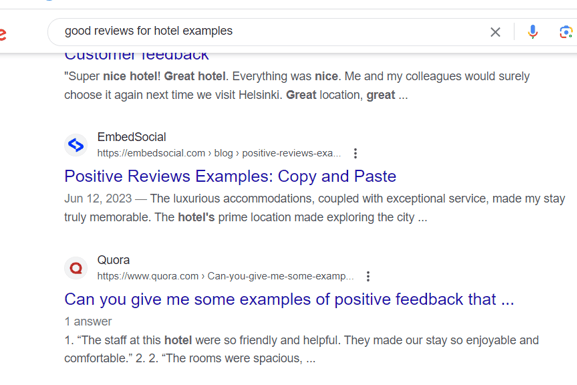
How do I know this is going to be a fraud? Well, can you think of any circumstances when you want to use ‘copy and paste’ of someone else’s positive review? If you’re trying to give an honest review for a hotel, you will write about YOUR experience and not someone else’s.
If you are describing other people’s experience in another hotel, claiming it to be yours… that’s fraud.
And to think that this ‘copy & paste’ of positive review site is number 3 in Google search engine… Which means many people are looking for this information. Makes you shudder… Especially if you are a person who believes in doing business honestly.
Travel reviews could be incomplete and outdated
Even when the reviewers are honest, they may provide an incomplete or outdated review, that became irrelevant.
Travel reviews can be inaccurate or incomplete, as they may not reflect the reality or the whole picture of the place or service.
Online reviews often become outdated or irrelevant, as they may not account for any changes or improvements that may have occurred in the place or service.
For instance, a positive review about a restaurant’s food and service may no longer be accurate if the menu, chef, or staff has changed.
A reviewer might have gone to a place a while back, and there’s a chance the place or service is different now because of renovations or new management.
Or, if someone visited a place during a busy time or for a special occasion, it could affect things like price, quality, or atmosphere.
They may not cover all the aspects or options that independent travelers may be interested in
Travel reviews could also be incomplete if a reviewer didn’t not cover all the aspects and features of a place or service. For example, a reviewer may only focus on the aspects that they liked or disliked, and ignore the ones that they did not use or notice.
The online review site itself can be not honest
We’ve covered why some reviews could be not honest, but what about online review sites? Are they honest? No, not always. They often give preferential treatment in exchange for compensation. This creates a negative impact on entire tourism, and it is a problem that needs to be recognized.
I will cover which online review platforms are better for user-generated reviews in my next post. I will write a few reviews on review sites (check and balances?;).
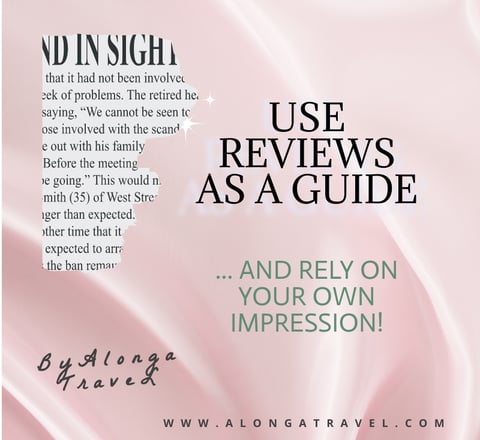
In conclusion, use all verified reviews as a guide and rely on your own impression.
So, it’s important to not just rely on the opinions of others when choosing where to stay or what services to use. Instead, think about what you personally want and need from your travel experience
To know if a hotel or service fits you, check various reviews from different places like official websites, forums and social media. Look for common themes and pay attention to reviews written by people with similar travel preferences and needs as you.
Remember that reviews are just one aspect of the decision-making process.
To choose the best option, research it yourself, ask your friends and family who like similar things. And then think about location, cost, and time of the year. Read my comprehensive guide on how to choose a vacation destination.
Pay it forward. If something goes wrong during your stay, tell the hotel or service provider in a helpful way so they can do better for the next person. If they don’t fix the problem, let other people know.
I hope this guide will help you learn how to read travel reviews and make the right choices for yourself!
Read my other posts and let’s connect on social media; the links are below in the footer.
How to decide in the place is right for you
Let’s connect on social media!
Found this post helpful? Please, consider supporting my work and the website maintenance cost, thank you!
Subscribe to my periodic newsletter for my new posts. New here? Visit my main Alonga Travel page.

